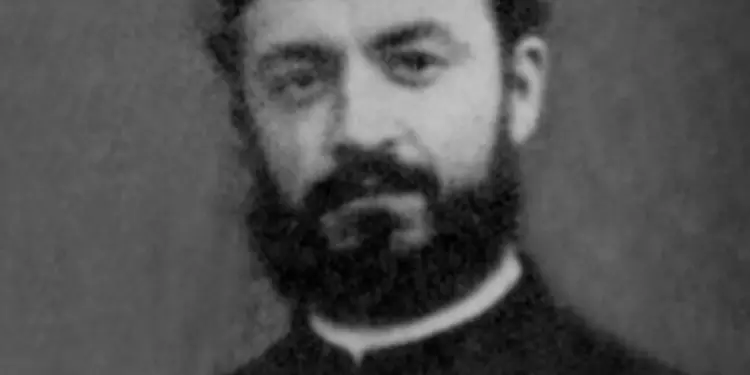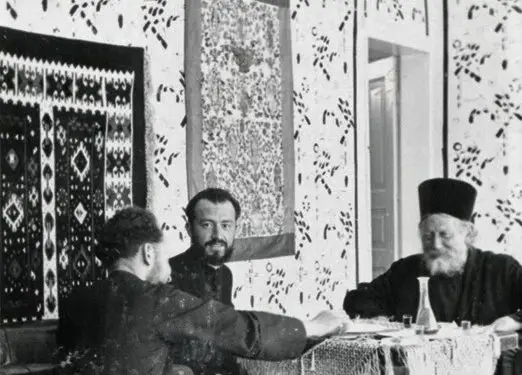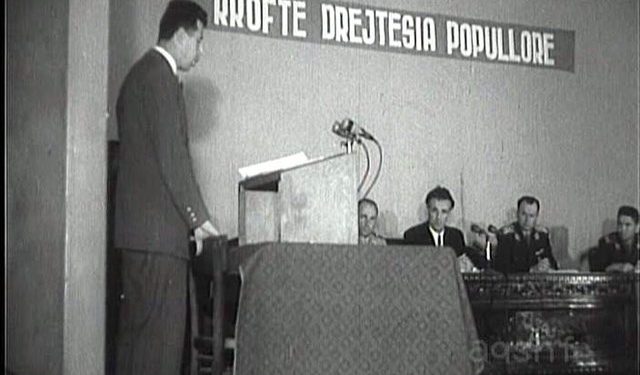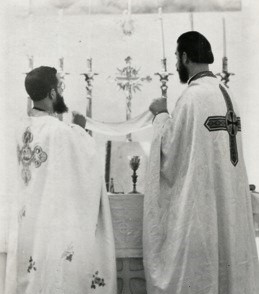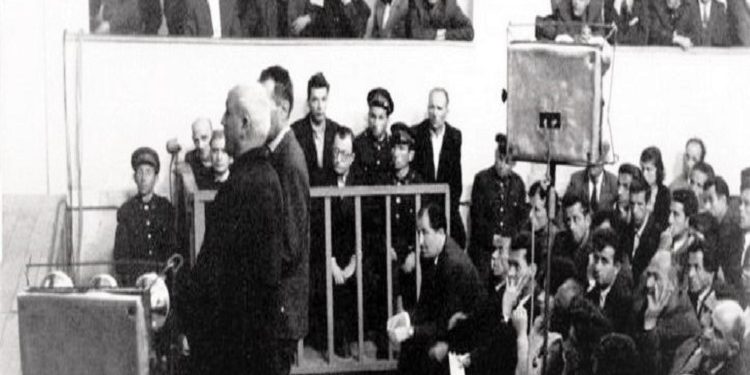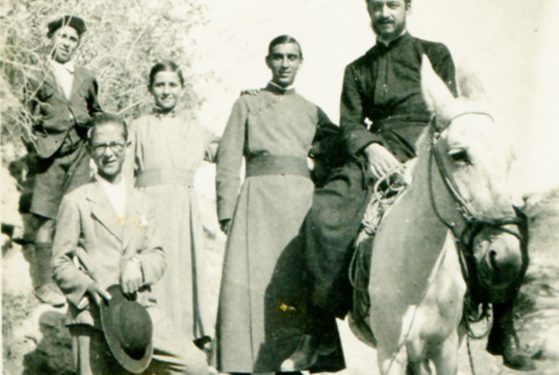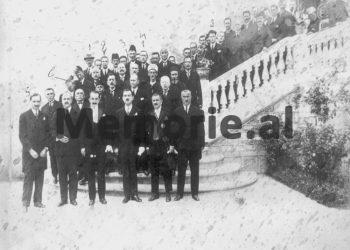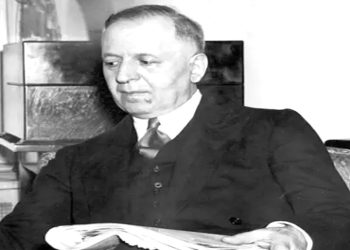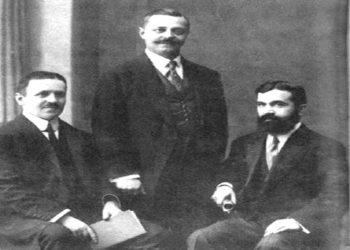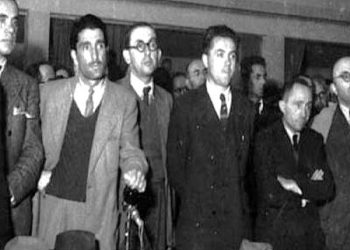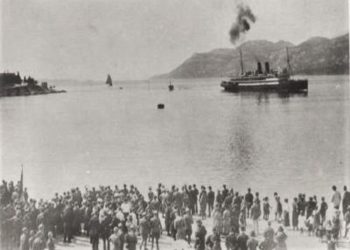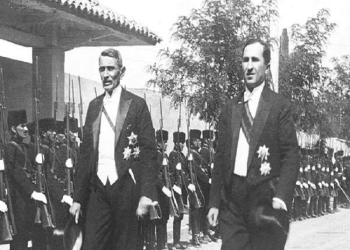By Fatos Salliu / Rudolf Deliana
Memorie.al / Today, the barbaric persecution suffered by the Albanian Catholic Clergy, starting after the coming to power of Albanian Communism in 1944, is well known. There are about 130 priests arrested, imprisoned, tortured, convicted without the slightest fault. The exact dimensions of this state terror can be found in the book entitled: “The Martyrdom of the Albanian Catholic Church 1944-1990”, compiled by an editorial staff of eight personalities and published in Shkodër in 1993. In the book, the names of each are given one by one of the victims that horror involved. Those names are given divided into seven groups, according to the sufferings and consequences they suffered. Thus, of the 129 arrested priests, 31 were shot, 8 died under torture, 4 were drowned or poisoned, 3 died as soon as they were released from prison, 24 died in prisons or internment camps, 38 died after being released from prison, and 25 were alive later. 1990 and continued the office of priest.
According to the authors’ account, all those arrested together have completed 450 years of university studies, and if taken together, they have been sentenced to 881 years in prison and exile! In the book, among others, the last word that some of the shot dead said before the firing squad is given.
In those words, there is no cursing, no cursing, and no hatred towards those who tortured and condemned them unjustly. Each of them, in their own words, has expressed their loyalty and devotion to religion and the Motherland.
Here we are giving only the words of Monsignor Frano Gjin. Before the shooting, he declared: “Long live Christ the King, long live Albania even without us!” (p. 88). Even the authors of the text have followed this path in their words. Thus, in the preface, the author Vili Kamsi, after pointing out how inhumane the investigators and judges of this massacre were, ads:
“Reading those who are described in this summary will fill us with pain for those who suffered the highest martyrdom for Religion and Fatherland, but at the same time, it should not encourage us to hate revenge for the communist criminals, who cost them so much suffering and misery of our people. May God forgive them?” (Book p. 2).
That all the convicted priests were from the North, except for one who was from Elbasan, from the “Kala” neighborhood. His name was Father Josif Papamihali and he is part of the four drowned and poisoned. The Papamihali family is one of the oldest in the neighborhood, probably descended from a priest named Mihal. Families with surnames of this nature still exist today in “Kala”, such as the Papajani, Papatruka, Papanikolla, etc. families.
Among the elders of the Papamihals, we remember Losh Papamihali, who lived in the 19th century. He was a contemporary, friend and close friend of Kostandin Kristoforidih. He left his memories in writing. During his life, Loshi was known as a wise and quite cheerful man.
He was an organizer of walks and entertainment in Shijon, very fond of songs and dances. He dressed beautifully, mostly in white clothes, that’s why in society, he got the nickname “Loshi i Bardhë”. He had no children; maybe he didn’t even get married. There was a brother, Constantine, who married and had two sons; Avi (Alqiviadhin) and Mihalin.
They both married and had ten children, who grew up together in the same house, where the descendants of Avi’s four sons and Mihal’s only son live today. After the birth of the children, the brothers died early one after the other and the orphans were raised by the sisters-in-law, as if they were sisters. Joseph was Avi’s first child.
He was born on September 23, 1912. He attended the neighborhood elementary school, where he stood out as a smart, wise and diligent boy. He finished it in 1923 and that same year, the missionary Archimandrite, Pjetro Skarpeli, took him and sent him to continue the religious secondary school of the Greek Abbey of Grotaferrata in Rome.
His religious formation begins there. He finished that school in 1930 and that same year, he started higher religious studies in Theology and Philosophy at the Greek Pontifical College of St. Athanasius in Rome. He was ordained in 1936; he surrendered to the priesthood and spent a few months near the people of Arbëresh in Lungro, Calabria.
Here the Apostolic Delegate in Albania takes him and installs him as a priest in the United Church of Saint Peter in Elbasan. He served there for a few years, and starting from 1945, he was transferred to Korçë, Pogradec, Lushnje, Berat, etc., until he ended up in Korçë. There he was arrested by the State Security, on October 31, 1946.
They keep him in prison until May 16, 1947, when his investigation begins, which ends after about six months, on July 2, 1947. On August 1, 1947, until October 3, 1947, three court sessions are held, which sentence him to 5 years of deprivation freedom, and forced labor, charging them 108 ALL as recourse tax? (Minutes, dt. 3.10.1947). Today’s descendants of Father Josif’s family have been able to find the minutes of the 13 investigation sessions and the three minutes of the three court sessions, which imposed the upper sentence.
Browsing them, you understand what the accusations were and what was the defense made by the accused. From the three upper court sessions, it appears that Father Josifi was accused as follows: “With the arrival of Italian Fascism in Albania, he manifested and sympathized with the occupier and was closely connected with other priests. After the Liberation of Albania, the reactionary policy of the Vatican continued.
He held meetings with reactionary elements, with whom he discussed issues against the People’s Power, as well as held meetings with Catholic leaders, with the aim of sabotaging the elections of December 2, 1945 and the establishment of the Demo-Christian party in Albania.
He made propaganda against the reforms….! He worked against the interests of the people of the Motherland, being subsidized with money by UNRRA agents, to form clandestine organizations, such as the “Democratic” organization. (Minutes dated 1.8.)
In relation to these accusations, Father Josifi has been questioned in detail in every session of the investigation. All questions have been answered one by one. As for his attitude towards the fascist occupier, he declares that he came out against him, because: “In the Church, I dealt with Catholic Albanians, saying mass in Albanian”. (Minutes, dt. 17.5).
In another case, he declares: “During the war I remained neutral” (P-V dt 1.8). In every hearing, the investigation emphasizes that it has never been involved in politics, because religion forbids priests from political propaganda.
He even declares about the Albanian priests in general: “I don’t know that any priest has helped L.Na.Çl., whereas with Balli and Legality there were many, but I can’t say that they participated officially” (Process-minute , dt 1.8.).
For this period, he shows that he maintained contact with his superior or subordinate priests, without carrying out any activity against the power of the homeland. Even for the serious post-war accusations, it shows that they do not stand. He admits that he has met and talked with some of the people mentioned in the accusations, but says that he only had friendly and family relations with them.
It also shows that the connections with the Catholic religious have been working in the Church and outside it. So in the session of dt. 17.05. speaking about the nuns of Korça, who had opened an infant school (kindergarten) and an embroidery course for girls and women, he says: “I ordered the nuns not to deal with political issues because they are categorically forbidden” (Minutes , dated 17.5).
He admits that with another priest; “…we have criticized as unfair the measures taken by the State against the Catholic Church of Elbasan and Korça, which did not deal with political issues” (Minutes, dated 20.5.).
It shows that it had nothing to do with UNRRA, or its people. As for the money he distributed to his subordinates, he says that he took it from his superiors and distributed it to them as salaries. It shows how much Napoleon gave to each. (Minutes, dt. 20.5).
Regarding their origin, he clarifies: “These funds came from the Episcopate of Durrës” (Minutes, dt. 20.5). Regarding UNRRA’s humanitarian aid, he says: “The aid that UNRRA gives us is good for us, and we have said that if we had friendship with the Anglo-Americans, it would be better for us” (Minutes, dated 16.5.).
The most serious accusation against Father Josif was that of “sabotaging” the elections of December 2, 1945 and “creating” the Christian Democratic Party. The investigation has also focused more on these accusations. Out of the 13 investigation sessions, 8 of them dealt with them.
The minutes of the first three are drawn up properly and detailed. From their reading, everything expressed by the defendant is understood. The other five are irregular notes. They have few sentences, almost without meaning, they are without dates, except for the last minutes. All of them are signed, by another person, an investigator who is noted as; “The person in charge of the section”.
These taken together, create the suspicion that they may not be real. From the answers given by Father Josif, in relation to the above accusations, it appears that all the priests had gathered and talked with each other, not to boycott the elections, but to determine whether or not it was up to them to participate in the polls.
According to Ati’s words, it appears that everyone was of the opinion that they should not vote, because the Democratic Front was led by the Communist Party, which was guided by anti-religious ideology, and that the deputies were affetarians or anti-religious.
There were only two or three who thought to vote, in order to protect and save the Catholic Church, which was going “toward a very difficult situation” (Minutes, undated). (It was the time when weapons were “discovered” in the Church of Shkodra and when many priests were arrested).
Father Josifi continues to show that for this problem, he also asked his superior, the Bishop of Durrës, Monsignor Vincens Prenushi, if it was good for them to participate in the elections. He replied: “This is not good, because it does not agree with the religious principle, since the deputies are of affective principles” (Minutes, dt. 2.7.47).
American reaction: The priest was buried alive
Father Joseph, not only proved his innocence, but also showed dignity in defense of religion, the Pope and the Vatican. He did this publicly in the two sessions of his trial, which took place in front of a wide audience….! “Unfortunately, the defendant was brought and placed in his special place in a public hearing…”! (Minutes, 1.8.47).
In this very session, he declares: “As a law in religion, politics is forbidden. My mission in Albania is to develop the people in the Catholic religion. The Pope was not related to Duce, since the Pope condemned the Doctrine of the Fascist Gentile” (I think the word “gentile” should be “executioner”). It continues below: “The Vatican has always loved Peace” (Minutes, 1.8.47).
In the next day’s session, for himself, he declares: “That my desire and my ideal, to study religion and wear this garment, to become a religious like I am”. As it seems, Father Josif Papemihali, even though he was in front of an open “grave”, remained faithful to his religious ideal. He was convicted even though he was completely innocent.
He was not sentenced to immediate death, such as shooting, but to “slow” death, which would last not five minutes, but five years! In fact, it “lasted” only about a year. Every day of the year, he “died” little by little in the war with the water, the leeches, the slush, the mud, the arduous journey, the lack of food, clothing and sleep, in what came to be known as; “Swamp of Death”, as his co-sufferer in the Swamp, the writer from Elbasan, Makensen Bungo, who also has a real character, named it in his book with the title; “Swamp of Death”.
His last breath was not taken by the shells of murderous rifles, but by the “murderous shells” of the hands of criminals, who drowned him alive in the mud and sludge of the Swamp. But communism “didn’t get enough” of this “slow shooting”!
He wanted to punish him with real shooting. He invented the “trick” after about 3 years. Father Josif’s brother, Kostaq Papamihali, worked in Tirana, as a simple accountant. A deficit in his accounts was “discovered”, inflated as a hostile act, and sentenced to death. He was shot in 1952, leaving his young wife a widow, and orphaning his only son, who had the name of his grandfather and was called Alqiviadh Papamihali!
This merciless and inhumane persecution was recognized by the whole world. The US ambassador to the UN made it known at the February 1955 session, when he presented his country’s report on political prisons in Albania. Mentioning the mistreatment of political prisoners of the time, he gives as an example the case of Father Josif, stating: “Priest Josif Papamihali, head of the United Church of Korça, was buried alive in the canal”.
Father Josif Papamihali, in the courtroom on August 1, 1947, in the presence of the jury and the public in the room, showed himself to be a true Albanian man. He knew what awaited him. He had found out what had happened in Shkodër, with the innocent priests there. Ballëhapur came to the defense of religion, denouncing communist ideology and the state as its enemies.
(It is for this reason that Pope Francis, this religious man devoted to his religion, would beatify him (in 2016), during his visit to Albania, declaring him a “Martyr of the Catholic Church”).
Father Josif Papamihali, in the courtroom, showed that he enjoyed respect and love for his Motherland and for God, two prominent characteristics of Albanianism. This is the reason why today Albania should announce it; “Martyr of Albanianism”. Bearing these qualities, his name entered the history of the Martyrs of our Nation, alongside all those who gave their lives in the fight for justice and progress. Memorie.al




